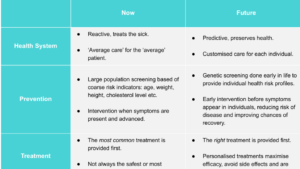Precision medicine, also known as personalised medicine, is a relatively new frontier for healthcare addressing the treatment and prevention of disease by combining individual variability in genes (genomics), big data analytics, environment, and lifestyle for each person. It allows treatment protocols to be finely tuned to each individual resulting in better health outcomes. Properly implemented, it has the potential to shift the focus of the current health system from the treatment of illness to the prevention of disease and achieve optimal health.
For years, practitioners have done their best to tailor their recommendations to individual factors such as age and gender, patient preferences, mobility levels, family history, community resources, pre-existing health conditions, and other mitigating circumstances. This is not to imply that practitioners didn’t recognise their patients as individuals. Or that they didn’t strive to provide the best and most individualised care possible, based on the most current and comprehensive information available to them.
However, the difference between a traditional assessment of a complex health situation and true “precision medicine” is the degree of reliance on data – especially genomic data – to make decisions about specific treatment recommendations and protocols that may be more effective for the individual being treated.
Genomic data is a relatively new addition to a practitioner’s toolkit, and many practitioners still do not use it in their practice due to not being skilled enough in the area of genomics to provide safe and confident interventions. Also, researchers are still navigating what revolutionary insights are likely hidden in the human genetic code. However, genetic testing nowadays is getting quicker and cheaper, offering researchers the opportunity to collect larger volumes of data from more diverse patient groups and provide practitioners detailed and easy to understand reports.
The great promise of the twenty-first century is the transition from universal standard care to universal precision care. Below is a table that outlines the difference between our current healthcare system without the use of precision medicine compared to a future system with it.
 Source: Office of the Chief Scientist – Occasional Paper, Oct 2018
Source: Office of the Chief Scientist – Occasional Paper, Oct 2018
Beyond treating disease, precision medicine includes approaches to diagnostics, prevention, and screening in the following ways:
- Methods for identifying those who are at risk before disease occurs
- Analytical tools for predicting which prevention strategies/protocols will work best for which patients
- Screening methods that can identify early signs of disease before symptoms emerge
- Diagnostic methods for identifying subtypes of disease that may look the same on the surface but respond very differently to treatment
- Tests that can identify disease carrier status for parents planning to conceive
- Devices for managing diseases and for tracking and guiding recovery
Precision Medicine in Practice
Dementia is the second leading cause of death in Australia in older adults. Sadly, it is degenerative, irreversible, and incurable. The most common form of dementia is Alzheimer’s disease. Several genes have been identified that appear to increase the risk of this disease with age. Researchers believe that early intervention for those at high risk will be the most promising way to delay onset, improve quality of life and ultimately beat the disease. Genomic research enables asymptomatic individuals who are at high risk to be involved in clinical trials to accelerate the discovery of effective therapies.
Although we have only scratched the surface of genomic analysis, continued research will help support and catapult precision medicine in the medical and health industry, to achieve better prevention, screening, diagnosis, treatment, monitoring and other issues related to healthcare. As a result, precision medicine will help to improve health outcomes and save money by targeting health interventions to those individuals who are most likely to benefit, underpinned by better understanding of individual diversity.
